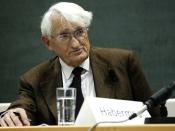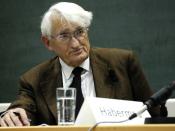What did Habermas mean by the Public Sphere? Is this concept at all useful for understanding the role of the mass media in contemporary society?
Jurgen Habermas by many is considered the most influential thinker in Germany; his ideas of the "public sphere" were developed in the enlightenment era of the eighteenth century and were considered revolutionary. These ideas in some parts of the world are still highly regarded and have become an integral part of the way in which some societies understand themselves.
Habermas' primary goal was to develop a theory of communication rooted in a concept of an "ideal speech situation".
In this essay I will discuss exactly what the "public sphere" is (also known as the "ideal speech community") and its usefulness in understanding the role of the mass media in contemporary society.
"All humans are created equal and should have equal rights in society; governments derive their just powers from the consent of the governed, and those governed therefore have the right to change the government if they so wish."
(The First Amendment to the US Constitution, 1971)
This is part of the opening paragraph of what we know as the bill of rights, which is in summary about freedom, of religion of expression and of speech, to name a few. The 'Social space' where these rights are openly exercised is where 'The public sphere' can be found. This is not only where communication and congregation of all equal human beings takes place, but is also where governments are able to be monitored in terms of their actions towards securing the life, liberty and happiness of the people.
For Habermas the Public sphere was a space in society where individuals were free to have open discussions unrestricted and free from the pressures imposed by dominant...


